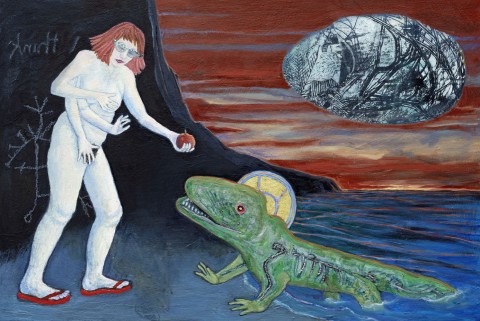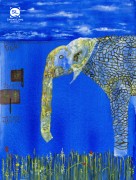I work as an oncological radiologist. My grandparents, my jeddo and teita, wanted a surgeon, but I am what I am, and I like my job. Every week I beam small doses of radiation into bodies. A few of those bodies are robust, but most are sick. Some shrivel. Many leak or shed. No matter how they are, I like to tell the bodies and the people inside them, “You’re doing great.” And I’m not just saying that as a professional courtesy — I really believe it. I think it’s necessary to love things the way you find them instead of how you wish they were. Like how I love my sister, even though when I call her she answers her phone, “What,” instead of, “Hello?” My sister is a lawyer, and I don’t think she’s ever told anyone that they’re doing great. But she’s survived because of her anger, and I think that deserves some kind of admiration.
At work there’s a white woman named Sue who brings me fruit. “I keep getting these organic fruit baskets,” she tells me. “All the time I feel like puking — what do I want with this fruit?” Gripping my arm, she says, “You have to laugh.” But she doesn’t.
Sue’s given me twenty-one apples, eleven oranges, seven pears, and one secret. The secret was that not everything about being sick is bad. “Most of it just sucks,” she said. “But all of a sudden I’m seeing the world. Like when I got my cataracts removed. I got my diagnosis and everything BAM, pulled into focus. I never realized it’s so beautiful out here. I mean, in the world. I didn’t know it was like this.” She laughs. “You must think I’m a nut.”
“If you’re a nut, then so am I,” I say. Then I tell Sue about my mom’s jewelry box. Before jeddo and teita got us full-time, my mother used to shoot crystal meth between her toes and take me and my sister on foraging trips through downtown. “God’s in everything,” she’d tell us, jittery hand holding up a shattered fragment of a car brake-light, half a plastic locket, the concaved torso of an empty cigarette carton. She kept the best things in her old jewelry box, and we spent hours looking at the treasures sleeping in the tiny drawers.
I tell Sue what my mom told me: that there are a million ways to worship this world. If you look hard enough, the miracle’s right in front of your face.
*
The clinic is brash with Christmas. Beside the automatic door stands the silver tree with its pox of ball ornaments. Santa figurines crowd a mini-Menorah on the receptionist’s desk. The plundered windows of the staff room advent calendar tell me it’s Christmas Eve.
“Radiologists sure know how to party,” Sue deadpans, taking in the office decor. She tells me she’s culturally Jewish, “so Merry Nothing,” and gives me a furry kiwi and a small green apple, hard as a stone. Today’s her last treatment, and she’s gussied up like it’s a party, done her makeup and hair, worn a tweed jacket veined with glitter threads.
In the radiation room, Sue places her jacket and shirt on a chair, pulls on the gown and arranges herself on the curved bed. Her fingers tickle the silver tassels of the Christmas garland I’ve taped along the bed’s edges.
“Is this stuff plastic?” she asks.
“Has to be,” I say. I move her arm slightly to the left, to better see the blue freckles tattooed on her breast. “It lasts forever.”
“There must be a million tons of it in garbage dumps all over the world,” she says.
“Cockroaches will outlive me and tinsel will outlive them. You’ve got to laugh.” This time she does.
After a few more minutes under the neon grid, I tell Sue she can put her arms down. We’re finished.
“It’s weird to say, but I’ll miss this,” she says.
I don’t know if she means the being sick or the getting well, or just the this-ness of the moment. But whatever she means, I can tell she really means it. I mean it when I say, “Me too.”
*
I live on my own in a small but pleasant apartment on the fourth floor of four floors. I chose the apartment because the living room has a wall-length window that on clear evenings gives a good view of the sunset.
Tomorrow, on what some people think of as a holy day, I’ll call my sister and she’ll say “Merry Christmas” in almost the same tone she says, “What.” Tomorrow I will think of jeddo and teita and my mother, who are all in one way or another gone.
Tonight, I take Sue’s apple out of my purse and put it on the ledge of the living room window, where it can see the sun waning toward the lip of the horizon. I ate Sue’s oranges and pears, but I kept every apple she brought. Now this new apple joins twenty-one others.
In the last pink light, I bend down and examine Sue’s apples. A few are fresh and plump. Many are yellowed, spotted. The oldest have withered into small brown fists that remind me of teita’s arthritic hands.
I smile at the apples. In time they will be dust, and even then I’ll still love them.
“You’re beautiful,” I say, patting them gently with my fingertips. “You’re doing great.”

Notes from Guest Reader Ashley Inguanta
The protagonist felt very special to me, very dear, and I’d never been to a place quite like this while reading. We learn that the protagonist’s mother believed that “there are a million ways to worship this world.” I also believe that there are a million ways to worship fiction, and right now I am fascinated with this character. I’d like to say “Thank you” to this fictional person in this fictional universe.


 The core workshop of SmokeLong Fitness is all in writing, so you can take part from anywhere at anytime. We are excited about creating a supportive, consistent and structured environment for flash writers to work on their craft in a community. We are thrilled and proud to say that our workshop participants have won, placed, or been listed in every major flash competition. Community works.
The core workshop of SmokeLong Fitness is all in writing, so you can take part from anywhere at anytime. We are excited about creating a supportive, consistent and structured environment for flash writers to work on their craft in a community. We are thrilled and proud to say that our workshop participants have won, placed, or been listed in every major flash competition. Community works.